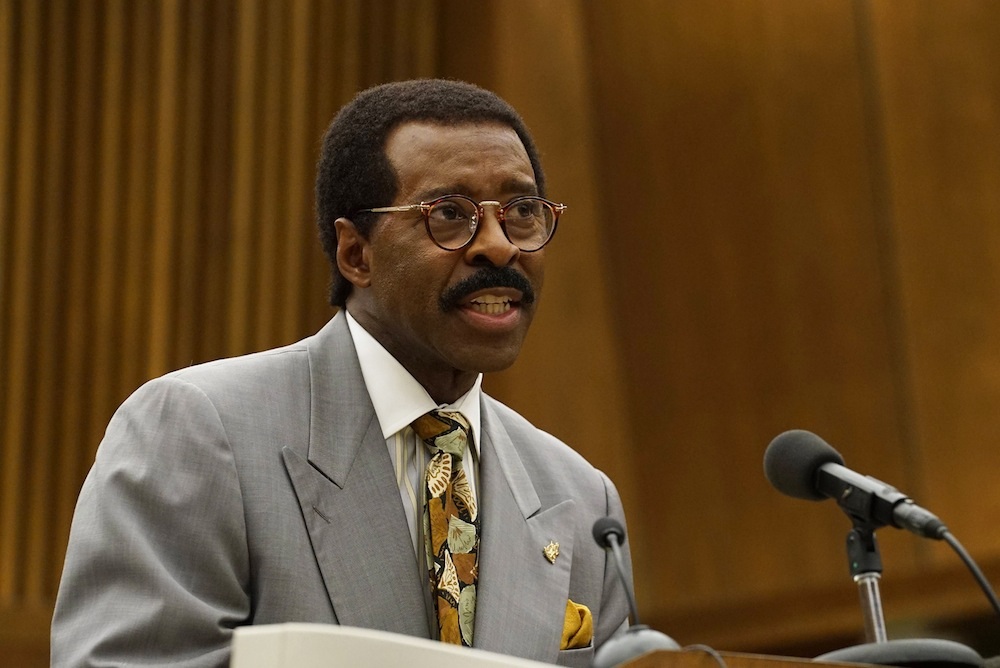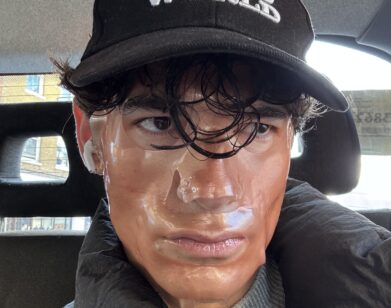Courtney B. Vance’s Johnnie Cochran

ABOVE: COURTNEY B. VANCE AS JOHNNIE COCHRAN IN THE PEOPLE V. O.J. SIMPSON: AMERICAN CRIME STORY. PHOTO COURTESY OF FX.
At first, Ryan Murphy‘s new show The People v. O.J. Simpson is compelling in its campiness, from flashbacks of Robert Kardashian (David Schwimmer) and O.J. (Cuba Gooding Jr.) dancing and doing cocaine in a cheesy ’90s club, to little Kim Kardashian and her sisters squealing with joy when their father is mentioned on television. Certain actors—John Travolta, Nathan Lane, and Billy Magnussen in particular—relish in the ridiculous self-absorption of their characters. As the series progresses, however, it becomes more and more difficult to watch. You remember that these are real people, and you start to get angry with them and angry for them. The sexist treatment of lead prosecutor Marcia Clark (Sarah Paulson) at the hands of the media is particularly difficult to stomach.
One of the most intriguing figures in Simpson’s trial is the silver-tongued Johnnie Cochran. Already a well-known lawyer, Cochran joined Simpson’s defense team at the request of the former NFL player’s lead attorney Robert Shapiro and quickly stole the show. There is a scene in the series where Cochran asks O.J. to profess his innocence, and O.J. obliges. Whether or not Cochran believed his client is another matter.
“I’m sure everyone has their own personal opinions as a human being,” says Courtney B. Vance, who plays Cochran. “But I really feel that, as a defense attorney, his job was not to prove O.J.’s guilt or innocence. That was on the prosecution. He was there to poke holes and create reasonable doubt,” the actor continues. “The prosecution didn’t prove the case beyond a reasonable doubt. That wasn’t on the defense—that wasn’t part of their job description. If there was a fault to be had, it would be on the prosecution.”
Raised in Detroit and educated at Harvard, Vance has spent much of his career on stage. He played Corey in the original Broadway run of August Wilson’s Fences in 1987 and starred opposite his wife Angela Bassett in His Girl Friday at the Guthrie Theater in 2005. More recently, he acted alongside Tom Hanks and Maura Tierney in Nora Ephron’s Lucky Guy (2013). We spoke with the 55-year-old actor via phone.
EMMA BROWN: I heard that you actually met Johnnie Cochran.
COURTNEY B. VANCE: I did. We were at a big party at his house years ago. I didn’t see him much because he was the hostess with the mostess, but he was very, very wonderful and gregarious. I enjoyed him.
BROWN: What made you want to play him?
VANCE: It’s one of the roles of a lifetime to be able to play someone like Mr. Cochran who was so influential. People knew about his work in regard to police brutality. He was very much a staple in the community—someone who, if there was trouble, people knew, “Go get Johnnie Cochran.” I think to this day, there is not that person. In this area that we’re having trouble with now in terms of police brutality towards blacks—black men specifically—who do you call to be able to get the word out? To get this thing stopped? When he passed away, there was a vacuum created. He had some very large shoes that have yet to be filled.
BROWN: Did you watch O.J.’s trial while it was happening?
VANCE: I did not. It was a little overwhelming for me, so this experience was an opportunity to fill in some of the gaps.
BROWN: As the series goes on, you learn some things about Johnnie Cochran’s backstory. I know he was a very public figure, but were you familiar with all the details of his life beforehand?
VANCE: I knew nothing about him. It was amazing to read Jeffrey [Toobin]’s book and other books about him. He was a force of life. He had a very, very, very large life and as with all of us, it ain’t all pretty. He was completely human. We loved him with all of his idiosyncrasies and foibles, but thank God he was there to help all the clients that he helped. It wasn’t just O.J., he helped a lot of well-to-do people and a lot of people who couldn’t afford to pay him. There was the Leonard Deadwyler case, where the gentleman was in the car driving with his pregnant wife to the hospital and was pulled over by the police. He ended up dead and the police officer got off. You just go, “How?” The idea that he was shot while his pregnant wife was in the car… it’s obvious the guy is going fast because he’s trying to get to the hospital. Just help him get to the hospital.
BROWN: Do you think Johnnie would be disappointed if he were still alive today?
VANCE: I think he would. I think more so than being disappointed, his gloves would be off and he would be full throttle with all these cases: Ferguson, this gentleman in Chicago who was shot with the mayor’s office for covering it up for a year, what’s going on in Flint with the water. There’s too much stuff going on. He would be furious.
BROWN: I found the show harder and harder to watch as you get more invested in the trial. Was it harder to film?
VANCE: I don’t know if it was harder, but it was more and more work. The first two episodes, I was very light, which gave me the opportunity to get my sea legs and get myself acclimated to the world. Some people had to jump right in. But once we got in that courtroom, it was all me and Marcia. For the closing arguments, I knew I wasn’t going to have a lot of time to prepare, [but] all of a sudden, I heard that we were going to do it two days from the time we got the script. I was like, “You’re kidding me? Give me a minute! Why do we have to do it at the top?” But there was nothing to do but cram the scene into your head and jump in. I remember I was the last one to go up—Marcia and Chris Darden went up before me—so by the time they called the scene at midnight, they said, “We’re going to do this later on in the week.” I was so grateful. By the time they actually got back to doing my portion of the scene, I was ready, and I was able to release into it.
BROWN: How do you get ready for something like that?
VANCE: You learn your lines as well as you can and you go in there and go with whatever is thrown at you. Sometimes you don’t know whether or not they’re going to break the scene up, so you don’t have to do it all at one time. Sometimes there are four or five cameras in front of your face moving all over the place, and you have to try to see the person in between the cameras, and a sane person would go, “I can’t do this.”
You need great actors in this one, because there are moments where there’s no way to get around it, you just need to come up with it. They have no time; they can’t help you with coaches: “We’ve got to have it now!” Whether it’s tears, whether it’s a five-page scene. You can’t put it off tomorrow because we’re already behind; you’ve got to have it. I’m just amazed at the casting and how wonderful everybody was.
BROWN: I know John Singleton, Anthony Hemingway, and Ryan Murphy all directed episodes. Was it nice to just have three directors?
VANCE: It was, because there was a sense of continuity. Really, there were just two directors, because John Singleton only directed one episode. He did the fifth episode. It’s comforting to know that you can ask someone what’s happening in this episode and they’ll be able to tell you. Sometimes we were doing two to three episodes at once, so it was a little hard to keep everything straight.
BROWN: I read you first became interested in acting when you were in university, is that correct?
VANCE: Yes, I was in college. I didn’t know anything about acting at all. I was completely green. I got into it to meet people, to try and figure out what I wanted to do. The furthest thing from my mind ended up being the thing I wanted to do.
BROWN: Was there a particular play you were in or moment when you realized that you were actually a talented actor?
VANCE: I didn’t realize it, but my aunt came and saw a play called Story Theatre and said, “You’re pretty good at this. You may want to think of this as a career.” That was it. I hadn’t even thought about it prior to that.
BROWN: Do you come from a creative family?
VANCE: No, not at all. My parents were all about education. My mother was a librarian—she retired after 30 years—and she made sure that we were always at museums, that we went to plays. We went to Stratford, Ontario, because I’m from Detroit. We were surrounded by books and by shows. It was a natural for me to end up in the theater because I’d done a lot of reading about it. When I grew up, there were no computers; if you wanted to find out something you had to go to the library. I grew up in the library.
BROWN: I know you’ve done a lot of stage work. Are there any classic roles that you’ve wanted to play and haven’t gotten a chance to yet?
VANCE: I’d love to do Long Day’s Journey into Night with a great cast. I’d love to do God of Carnage. James Gandolfini did it on Broadway about five years ago; it was a four character play and very funny. Jeff Daniels was in it. That would be amazing.
THE PEOPLE V. O.J. SIMPSON: AMERICAN CRIME STORY PREMIERES TOMORROW, FEBRUARY 2, 2016, ON FX.






